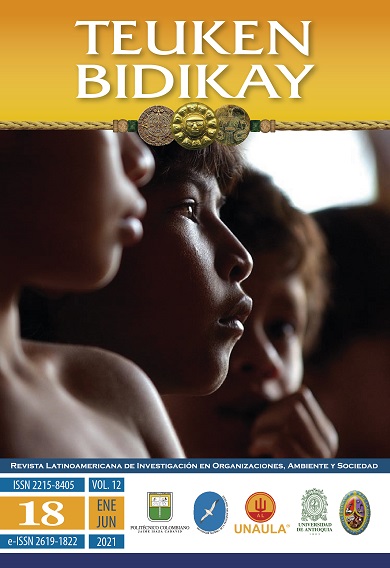The management of organizational quality and the administrative competences: A literatura review.
DOI:
https://doi.org/10.33571/teuken.v12n18a3Keywords:
human competences, administrative competences, quality, quality managementAbstract
The article presents a literature review developed as a theoretical framework for an investigation aimed at understanding and discussing the administrative competencies of managers of the metalworking industrial sector and its impact on quality management. The review was carried out using some pioneering texts, the primary handbooks in these fields of study, and databases of specialized publications. This review constitutes an opportunity to, in subsequent studies, begin to identify the administrative competencies that managers in this context ought to possess and to investigate how they contribute to the effectiveness of organizational quality management.
Article Metrics
Abstract: 1376 PDF (Español (España)): 537PlumX metrics
References
Atehortúa, F., Bustamante, R., y Valencia, J. (2009). Sistema de gestión integral. Universidad de Antioquia.
Bédard, R. (1995). Les fondements philosophiques de la direction. [Thése de Doctorat en administration, HEC Montréal.
Bisquerra, R., y Pérez, N. (2007). Las competencias emocionales. Educacion, 21(10), 61-82.
Bonelli, F., & Cabral, S. (2018). Efeitos das Competências no Desempenho de Contratos de Serviços no Setor Público. Revista de Administração Contemporânea, 22(4), 487-509. doi:https://doi.org/10.1590/1982-7849rac2018170152
Boyatzis, R. (1993). Beyond competence: The Choice to be a leader. Human Resource Management Review, 3(1), 1-14.
Boyatzis, R. (2008). Competencies in the 21st century. Journal of Management Development, 27(1). 5-12. doi:10.1108/02621710810840730
Bronckart, J., y Dolz, J. (2007). La noción de competencia: su pertinencia para el estudio del aprendizaje de las acciones verbales. En Bronckart, J. P. Desarrollo del lenguaje y didáctica de las lenguas (147-165). Miño y Dávila.
Carrasco, M., Miquilena, Y., & Di Fiore, M. (2012). Competencias gerenciales en organizaciones empresariales y en organizaciones emergentes. Global Conference on Business & Finance Proceedings, 7(2), 1060-1064.
Castillo, D., y Martínez, J. (2010). Enfoque para combinar e integrar la gestión de sistemas. Icontec.
Christou, E. (2002). Revisiting Competencies for Hospitality Management: Contemporary Views of the Stakeholders. Journal of Hospitality &Tourism Education, 14(1), 25-32.
Coriat, B. (2000). El taller y el cronómetro.Ensayo sobre el taylorismo, el fordismo y la producción en masa. Siglo XXI Editores.
Crosby , P. (1995). Calidad sin lágrimas. El arte de Administrar sin problemas. CECSA.
Crosby, P. (1982). One Point of View: Quality Assurance. The Management of Quality. Research Management, 25(4), 10-12. doi:101080/00345334.1982.11756735
Crosby, P. (2000). La Calidad y Yo. Pearson Educación.
Cubillos , M., y Rozo, D. (2009). El concepto de calidad. Historia, evolución e importancia para la competitividad. Revista Universidad de la Salle, (48), 80-99.
Dean, J., & Bowen, D. (1994). Management Theory and total quality: Improving research an practice through theory development. Academy of Management, 19(3), 392-418.
Deming, E. (1986). Calidad, Productividad y Competitividad. La salida de la crisis. Díaz de Santos S.A.
Deming, W. (1993). The New Economics for industry, government, education. Díaz de Santos S.A.
Dooley, K. (2000). The paradigms of Quality: Evolution and Revolution in the History of the Discipline. Advances in the Management of Organizational Quality , 32, 1 - 28.
Du, Y., Yin, J., & Zhang, Y. (2015). How innovativeness and institution affect ISO 9000 adoption and its effectiveness: evidence from small and medium enterprises in China. Total Quality Management, 27(11-12), 1315-1331. https://doi.org/10.1080/14783363.2015.1075874
Dunford, B., Mumford, K., Boss, W., Boss, A., & Boss, D. (2019). Integrated conflict management systems pay off with lower levels of formal grievances and lower turnover rates. ILR Review, 73(2), 528-551. https://doi.org/10.1177/0019793919882892
Evans, J., y Lindsay, W. (2015). Administración y control de la calidad. Cencage Learning.
Falconi, V. (1994). TQC Control de la Calidad Total. Fundação Christiano Ottoni.
Feigenbaum, A. (1983). Total Quality Control (3rd ed.). McGraw-Hill.
Felgate, Y. (2020). Human resource management moral competencies. SA Journal of Human Resource Management, 18(0), 1-8. doi:https://doi. org/10.4102/sajhrm. v18i0.1193
Flynn, B., Schroeder, R., & Sakakibara, S. (1994). A framework for quality management research and an associated measurement instrument. Journal of Operations Management, 11(4), 339-366. https://doi.org/10.1016/S0272-6963(97)90004-8
Goleman, D., & Boyatzis, R. (2008). La inteligencia social y la biología del liderazgo. Harvard Business Review. América Latina, 86(9), 86-95.
González, A., Maldonado, X., Nava, L., y Ramírez, D. (2013). Evaluación de la gestión de calidad en la Facultad de Ciencias Económicas y Sociales de la ULA: aplicando el modelo de excelencia EFQM. Visión Gerencial, 12(2), 293-324.
Icontec. (2008). NTC-ISO 9001. Sistema de gestión de la calidad. Requisitos. Icontec.
Ikram, M., Zhang, Q., y Srofe, R. (2020). Future of quality management system (ISO 9001) certification: Novel grey forecasting approach. Total Quaity Management & Business Excellence, 1-28, https://doi.org/10.1080/14783363.2020.1768062
Ishikawa, K. (1986). ¿Qué es el Control Total de Calidad? La modalidad japonesa. Norma.
Juran, J. (1990). Juran y el liderazgo para la calidad. Manual para ejecutivos. Díaz de Santos S.A.
Juran, J., y Gryna, F. (1994). Manual de Control de Calidad. McGraw Hill.
Kakar, S. (1970). Frederick Winslow Taylor. Ecole des Hautes Etudes Commerciales de Montreal.
Kannan, V., & Bose, S. ( 2012 ). Improving the service quality of ocean container carriers: An Indian case study. Benchmarking: An International Journal, 19(6), 709-729.
Korossy, K. (1999). Modeling Knowledge as Competence and Performance. En Albert, D. & Lukas, J. Knowledge Spaces: Teories, Empirical Research, and applications (103-132). LEA Publishers.
Krishnamoorthi, K., & Krishnamoorthi, R. (2012). A first course in Quality Engineering. Integrating Statistical and Management Methods of Quality (2nd ed.). CRC Press.
Lombana, J., Cabeza, L., Castrillón, J., & Zapata, Á. (2014). Formación en competencias gerenciales. Una mirada desde los fundamentos filosóficos de la administración. Estudios gerenciales, 30(132), 301-313.
London, B. (1932). Ending the depression through planned obsolescence.
Macaluso, I. (2014). Competencias Claves Futuros Managers. Universidad de Córdoba.
Machado, M., Telles, R., Sampaio, P., Queiroz, M., & Fernandes, A. (2018). Perfomance measurement for supply chain management and quality management integration. Benchmarking: An International journal, 27(7), 2130-2147. https://doi.org/10.1108/BIJ-11-2018-0365
Maderuelo, J. (2002). Hablemos de... Gestión de calidad. Gestión de la calidad total. El modelo EFQM de excelencia. Medifam, 12(10).
Markides, C., & Williamson, P. (1994). Related deversification, core competences and corporate perfomance. Strategic Management Journal, 15, 149-165. http://www.jstor.org/stable/2486881
McClelland, D. (1973). Testing for Competence Rather Than for “intelligence”. American Psychologist, 28(1), 1-14. https://doi.org/10.1037/h0034092
McClelland, D. (1998). Identifying competencies with behavioral-event interviews. Psychological science, 9(5). 331-339.
Mejía, C., Herrera , J., Zambrano, S., y Medina, V. (2020). Competencias Gerenciales en el clima organizacional de las empresas del sector de calzado. Cienciamatria, 6(10), 129-157.
Merriam-Webster. (2003). North American Dictionary (11th ed.). Merriam-Webster, Incorporated.
Muñoz, R. (2011). Formar en administración. Por una nueva fundamentación filosófica. Fondo Editorial Universidad EAFIT.
Nikitina, T., & Lapina, I. (2018). The concept of manager: Critical analysis and competencies requiered. 10th International Scientific Conference (236-244). Vilnius, Lithuania: https://doi.org/10.3846/bm.2018.27.
Olarte, A. (2017). Desarrollo de habilidades gerenciales y el compromiso organizacional de los trabajadores de la división de control de transporte Sunat, 2016. Universidad César Vallejo.
Omachonu, V. y Ross, J. (1995). Principios de la Calidad Total. Diana.
Pandey, M., & Pandey, P. (2015). Global Employability of Unemployed Youth through Soft Skills. International Journal of Multidisciplinary Approach and Studies, 2(2), 73-77.
Post, H. (1997). Building a strategy on competences. Longe Range Planning, 30(5), 733-740.
Prahalad, C., & Hamel, G. (1990). The Core Competence of the Corporation. Harvard Business Review, 68(3). 79-90.
Prahalad, C., & Hamel, G. (1994). Strategy as a field of study: Why search for a new paradigm? Strategic Management Journal, 15(S2), 5-16. http://www.jstor.org/stable/2486873
Reynaud, J.-D. (2001). Le management par les compétences: un essai d’analyse. Sociologie du travail, 43(1), 7-31.
Samani, M., Ismail, N., Leman, Z., & Zulkifli, N. (2017). Development of a conceptual model for risk-based quality management system. Total Quality Management, 30(5-6), 483-498. http://dx.doi.org/10.1080/14783363.2017.1310617
Shewhart, W. (1931). Economic Control of Quality of Manufactured Product. American Society for Quality Control.
Sousa, R., & Voss, C. (2002). Quality management re-visited: A refelctive review and agenda for future research. Journal of Operations Management, 20, 91-109.
Thorndike, E. (1927). The measurement of intelligence. Columbia University.
Teece, D., Pisano, G., & Amy , S. (1997). Dynamic capabilities and strategic management. Strategic Management Journal, 18(7), 509-533. http://www.jstor.org/stable/3088148
Useche, M., Gilder, M., & Guerrero, P. (2019). Competencias gerenciales en el ámbito empresarial zuliano. Revista de Ciencias Sociales, 25(1), 173-185.
Vaca, J., Aguilar, V., Gutiérrez, F., Cano, A., y Bustamante, A. (2015). ¿Qué demonios son las competencias? Instituto de Investigaciones en Educación.
Valenzuela , L., & Rosas, J. (2007). Los criterios Baldrige aplicados a la gestión por calidad total y a la excelencia en el desempeño de la educación universitaria. Horizontes Empresariales, 6(1), 37-47.
Weckenmann, A., Akkasoglu, G., & Werner, T. (2015). Quality management – history and trends. The TQM journal, 27(3), 281-293. doi: 10.1108/TQM-11-2013-0125
Wilson, J., & Campbell, L. (2018). ISO 9001:2015: the evolution and convergence of quality management and knowledge management for competitive advantage. Total Quality Management. 761-776. https://doi.org/10.1080/14783363.2018.1445965
Xu, L., Peng, X., Pavur, R., & Prybutok, V. (2020). Quality management theory development via meta-analysis. International Journal of Production Economics, 229, 1-16. https://doi.org/10.1016/j.ijpe.2020.107759
Downloads
Published
How to Cite
Issue
Section
License
Copyright (c) 2021 Yudi Marín Álvarez, Héctor L. Bermúdez

This work is licensed under a Creative Commons Attribution-NonCommercial-ShareAlike 4.0 International License.


























